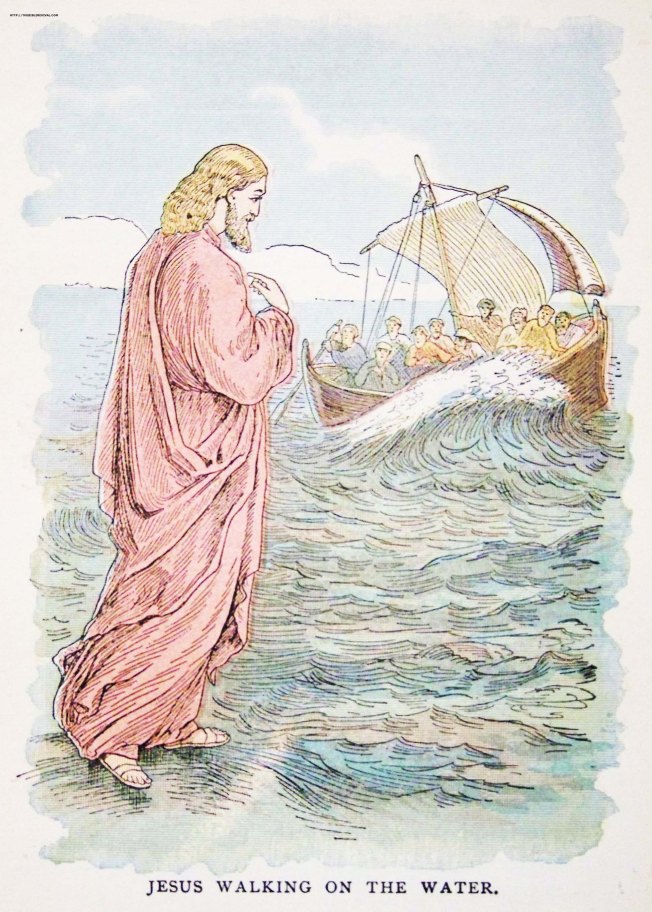“Don’t Be Troubled”
John 14:1-4, 25-27 (14:27) – August 26, 2018 – from Dave Ivaska’s book Be Not Afraid
Have you ever felt the pain and loss of an upcoming separation, even before it actually happened? Perhaps a good friend or relative is moving far away, soon Or, maybe a loved one is seriously ill in the hospital, in fact, terminally ill. You deeply feel the upcoming, approaching loss even when your loved one is still right there, with you.
Those two situations, those two instances are similar to what actually happened to the disciples. For all they knew, their Rabbi Jesus was going away, permanently. Jesus knew He was going to be parted from His friends for a while. Jesus gave His farewell speech in the Upper Room. What could any of the disciples do or say?
Let us back up a bit. The disciples did not anticipate exactly what events were going to happen. It is not that He kept quiet about His leaving and going away. It was others, the disciples, who said, “Where are you going, Lord?” What could some possibly hear that Jesus said would happen?
Here in the Gospel of John, the writer John wanted everyone to know that Jesus was in His final efforts to convince His disciples. Jesus knew very well what was going to happen. This discourse is one of utmost significance. Jesus gave the fullest explanation in answering these questions, and in expressing His longing, His care in this Upper Room discourse.
I realize that we here in suburban Chicago are not quite as familiar with the extent of the separation, heightened fear, and anxiety the disciples were facing during that Passion Week before Jesus’s crucifixion. But, many people today do face separation, and anxiety, too. In some cases, their feelings and emotions might border on severe fear, even terror. And, in some cases, these feelings and emotions are diagnosed as mental health challenges.
“According to U.S.A. Today (11/16/11), ‘More than 20 percent of American adults took at least one drug for conditions like anxiety and depression in 2010 … including more than one in four women.’ The Anxiety and Depression Association of America reports (adaa.org/about-adaa/press-room/facts-statistics, bold type theirs), ‘Anxiety disorders are the most common mental illness in the U.S., affecting 40 million adults in the United States age 18 and older (18% of U.S. population).’” [1]
Thank God, we do have ways of managing that anxiety, even severe fear, today. Let me say that the various types of therapy and group support and medication we have available to us are all valid. These are all ways to manage anxiety and fear. Jesus gives us another way of managing our anxiety and fear, too.
Listen to the words that Jesus had for us in the reading today, from the new, modern translation “The Message.” From John 14: 1-4 “Don’t let this throw you. You trust God, don’t you? Trust me. There is plenty of room for you in my Father’s home. If that weren’t so, would I have told you that I’m on my way to get a room ready for you? And if I’m on my way to get your room ready, I’ll come back and get you so you can live where I live. And you already know the road I’m taking.”
The words that we are more familiar with, “Do not be troubled,” Eugene Peterson translates “Don’t let this throw you.” The disciples had good reason to be troubled and afraid! They knew that the Jewish leaders were out to get their leader, their Rabbi. And yet—Jesus had walked straight into the trap the leaders were setting for Him. Talk about anxiety! The disciples had every right to be scared to death!
Yes, separation can be triggered by fear and anxiety; in certain of the disciples’ cases, the fear and anxiety of just not knowing. Not knowing anything. That can be a scary prospect, indeed. The disciples enjoyed a deep intimacy with their Rabbi Jesus. Thus, “the disciples were full of fearful questions when Jesus announced His departure. Yet Jesus understood their troubled hearts and assured them of a continued home together.” [2]
That was in the case of the disciples, two thousand years ago. But, what about us, today? We can see from Jesus’s words that He means a relational dimension to our interaction with Him. Yes, we can enjoy intimacy with each other, and intimacy with God. At the same time, we can be fearful and anxious at the prospect of separation—even that most permanent of separation, death itself.
How can we sort out these deep-seated feelings? Yes, fear and anxiety are part and parcel of all of us human beings. These feelings are part of our emotional make-up. Jesus goes right to the heart of our fear of separation and loss of intimacy with His words that tell us “I’m getting a room ready for you!” This image describes “the mutuality and reciprocity of the relationship of God and Jesus… [In fact,] Jesus uses the domestic image to say ‘My return to God will make it possible for you the join in the relationship that the Father and I share.’” [3]
How awesome is that? We all can join in on that relationship. Jesus lovingly invites us into that family relationship with God our heavenly Father.
But, that is not all, especially at this stressful, anxious, fear-producing time right before Jesus knows He is going to be arrested and crucified. Listen to our Lord’s assurance to us, from Peterson’s modern translation of John 14:25-27: “I’m telling you these things while I’m still living with you. The Friend, the Holy Spirit whom the Father will send at my request, will make everything plain to you. He will remind you of all the things I have told you. I’m leaving you well and whole. That’s my parting gift to you. Peace. I don’t leave you the way you’re used to being left—feeling abandoned, bereft. So don’t be upset. Don’t be distraught.”
As if a close relationship with Jesus is not enough, He even promises us the gift of a dear Friend, the indwelling Holy Spirit. Even more amazing!
We are encouraged to think carefully about whether or not we have truly laid hold of the cure for troubled hearts that Jesus promises in our scripture reading today. “Faith in Christ’s person and hope in Christ’s promise will comfort your troubled heart. You may think, ‘That’s overly simplistic! That’s a nice thought, but it’s impractical and out of touch with reality!’ But these are the words of the Lord Jesus Christ to troubled hearts. Either His words are true or they’re not.” [4]
Do you hear? Jesus did not leave His disciples abandoned and bereft, all alone, fearful with separation anxiety. What is more, Jesus does not leave us alone today, either. Sure, we may go through difficult times, but Jesus promises to walk with us.
We will have challenges and difficulty in this world, true, yet we have an intimate relationship with God freely offered to us. So, that is our Lord’s parting gift to us all. His peace. Don’t be upset. Don’t be distraught. Be not afraid. We have Jesus’s word on it.
Alleluia, amen.
[1] bible.org/seriespage/lesson-75-comfort-troubled…
https://bible.org/seriespage/lesson-75-comfort-troubled-hearts-john-141-11
[2] Ivaska, David, Be Not Afraid (Downers Grove, Illinois: InterVarsity Press, 2000), 110.
[3] O’Day,Gail R., The Gospel of John, New Interpreters Bible Commentary, Vol. 9 (Nashville, TN: Abingdon Press, 1995), 741.
[4] bible.org/seriespage/lesson-75-comfort-troubled…
https://bible.org/seriespage/lesson-75-comfort-troubled-hearts-john-141-11
(Suggestion: visit me at my regular blog for 2018: matterofprayer: A Year of Everyday Prayers. #PursuePEACE – and my other blog, A Year of Being Kind . Thanks!)




